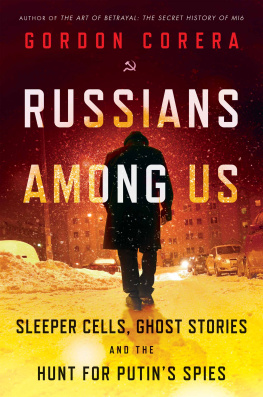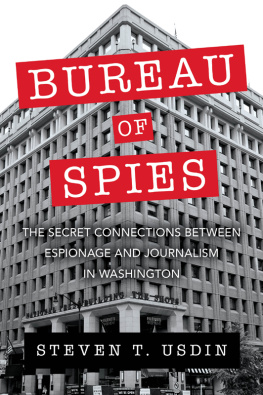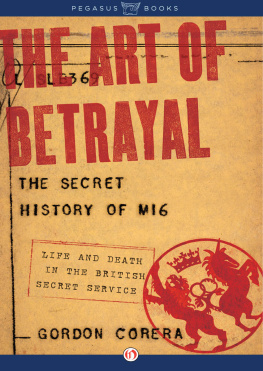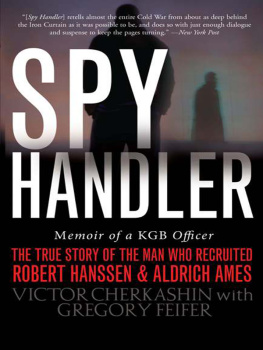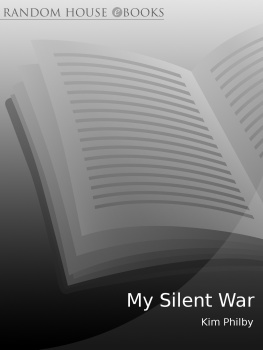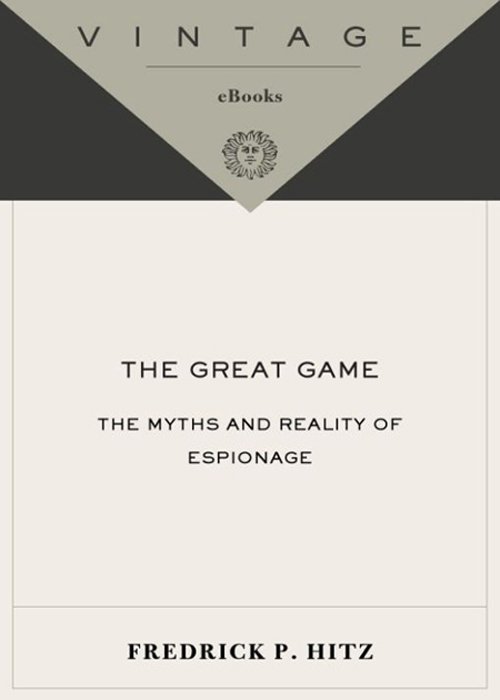
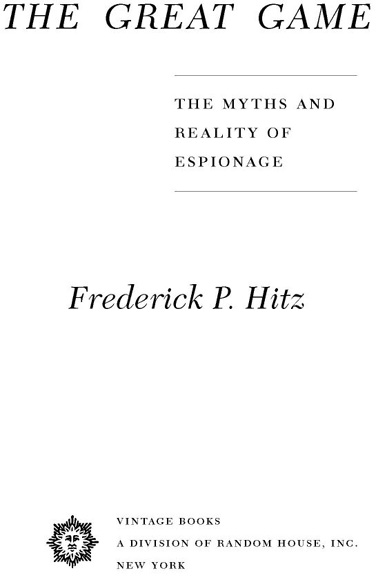
Table of Contents
To
Mary Buford
and Eliza,
the only women
in my life
Acclaim for Frederick P. Hitzs THE GREAT GAME
A delightful little jewel of a book.... A steady stream of insiders reflections, including details regarding American traitors, makes this not only a smooth and entertaining read, but a handy reference work. The Roanoke Times
Hitz is a strong researcher who can turn a nifty phrase.... Enjoyable and useful. St. Louis Post-Dispatch
Informative and entertaining. Publishers Weekly
Perfect for spy-story fans who crave an insiders assessment of the reality behind the entertainment. Booklist
A slender but richand quite entertainingintroduction to the shadowy world of spy vs. spy.... A perfect companion for fans of John le Carr. Kirkus Reviews (starred)
Introduction
When he comes to the Great Game he must go alonealone, and at peril of his head.... From time to time, God causes men to be bornand thou art one of themwho have a lust to go abroad at the risk of their lives and discover newstoday it may be of far-off things, tomorrow of some hidden mountain, and the next day of some near-by men who have done a foolishness against the State. These souls are very few; and of these few, not more than ten are of the best.... We of the Game are beyond protection. If we die, we die. Our names are blotted from the book.... When everyone is dead the Great Game is finished. Not before.
This is a book about the Great Gameespionage, or spying.
Kim Philby, who knew something about the subject, defined espionage as the collection of secret information from foreign countries by illegal means. That strikes me as a useful definition.
The information collected must be secret, or protected by its owner from disclosure in the normal course of events.
The information itself must have some strategic significance. As Sherman kent, one of the founders of the Board of National Estimates at the CIA, once wrote, it ought to be information requiring action by policy makers.
The information must come from foreign countries. We are not talking about domestic snooping.
Finally, the information must be acquired by illegal means. The owner or creator of the information does not want to give it up. It has to be stolen.
In the popular mind, espionage most often connotes humansource intelligence, or HUMINT, in the bafflegab of the spy bureaucracies. In other words, it is information obtained from human agents, or spies, usually under an arrangement in which the agents participate wittingly or willingly.
In the United States, espionage has often entailed a mixture of the technical and the human. In this we took our lead from the British. We were introduced to the mysteries of signalsintelligence, or SIGINT, in World War I with the interception of the Zimmermann telegram by the British Secret Intelligence Service in 1917, and the incident helped bring us into the war. In the 1920s, with Herbert O. Yardleys Black Chamber in the State Department, the United States successfully read Japanese naval telegrams and was thus able to monitor the buildup of the Japanese fleet.
The crowning achievements in this early era came about when the British acquired replicas of the German Enigma code machine in 1939, through Polish intermediaries. The spectacular success at decryption that then took place at Bletchley Park enabled the British and the Americans to read German diplomatic and military signals traffic during World War II. The United States soon followed by cracking the Japanese naval code leading to a successful interdiction of the Japanese fleet in the Battle of Midway in 1942. SIGINT cooperation between the United Kingdom and the United States continued after the war and led to some of the most spectacular espionage successes of the Cold War.
In addition, the United States developed some remarkable technical capabilities on its own in the mid-1950s with the U-2 overhead reconnaissance aircraft. Later the Corona satellite program succeeded in photographing Soviet missile test sites and indeed every inch of Soviet territory over time.
Covert action (CA), or what the British term special operations, largely involves human agents, but it is action-oriented as opposed to information-oriented. Covert action may be as simple as disseminating unattributable or black propaganda, or as big and complex as coup plotting, assassination planning, sabotage, or waging guerrilla war. The principal feature that distinguishes covert action is that the hand of the perpetrator is intended not to show. U.S. intelligence invented the seemingly benign term plausible deniability.
In spy fiction, by contrast, there is little distinction drawn between operations designed purely for the production of intelligence information (classic espionage) and those mounted to produce a physical result (covert action). As we shall observe, the human qualities and spy tradecraft which bring about success in classic espionage operations are often at war with the boldness and manipulative techniques needed for a successful covert action operationand where the same people are called upon to do both, there is often a conflict in disciplines, sometimes leading to systemic malfunction. By definition, spy operations to collect intelligence information are designed to be carried out clandestinely and often over a long time period. Their very success depends upon maintaining secrecy. Iraq is never to know if the CIA penetrated Saddams inner circle. By contrast, covert action is intended to produce a visible outcome. Only its true sponsorship is intended to remain a secret.
Finally, the collection of secret information from foreign countries by illegal means presupposes that nations that do not wish their secrets to be stolen will seek to combat the theftby counterintelligence (CI). Counterintelligence refers both to the efforts made to protect ones own secrets and to the measures taken to penetrate a rival intelligence service to learn its secrets. Many of the great fictional spy stories are in fact tales of counterintelligence.
This book arises out of an eponymous freshman seminar that I have been teaching in recent years at Princeton University. In the seminar, great works of spy fiction are compared to actual espionage operations. In the course of this seminar, my students and I have concluded that if one leaves the more fantastic conceits of Ian Fleming and Tom Clancy aside, real espionage cases are often more bizarre, more deserving of a place in Ripleys than the fictional accounts.
Although spying is often referred to as the second-oldest profession, the spy novel as a distinct literary genre dates only from the late nineteenth century. I thus start my seminar with Rudyard Kiplings Kim, which depicts espionage in defense of empire, the Great Game. This term of course refers to the competition among Britain, France, and czarist Russia for control of the Hindu Kush, and the area now encompassed by the modern states of Afghanistan, Pakistan, and much of India. In Kim and the other early spy novels such as Erskine Childerss The Riddle of the Sands and John Buchans The Thirty-nineSteps, the spy is the protagonist. He is the man on the ground who does the dirty work, and the novel is about his adventures. Later, as the genre matures, the focus shifts. We learn more about the organizations created to run or catch spies and focus less on the spy as hero. The hero, if there is one, is the case officer or spy runner who is managing or pursuing the spy.
Next page


